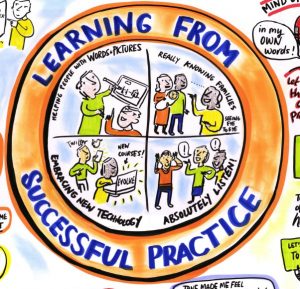When Tracey O’Mahoney-James joined Bexley children’s services as a consultant social worker and practice educator, it was after colleagues who already worked there sold her on the training. And that’s because training, growing as a practitioner and helping colleagues to do the same, is at the heart of her professional ethos.
“I think we need to always update ourselves. We need to continuously learn within this profession,” Tracey explains.
Two years on, she now oversees the London borough’s training offer as the lead for workforce development. It’s a natural fit for her, a role that gives her an opportunity to share her personal commitment to professional development with her colleagues across the service.
“I found it to be a really exciting opportunity, it was something different from what I had done before but it felt right and gave me an opportunity to really develop myself even further.”
This passion for training and career progression is not just Tracey’s, it’s the whole council’s. It is something Bexley invests heavily in, annually producing a programme containing more than 150 learning and development events on various topics for practitioners, stretching from one-hour sessions to five-day ones.
Some, on the council’s Signs of Safety practice model, are mandatory and many are delivered in-house by the borough’s consultant social workers, practice development leads and topic leads to keep every practitioner on top of the council’s approach, which it knows through feedback from children and families is making a positive difference to their lives.
Other topic areas included in the past year are on asking helpful questions, best practice with looked-after children, ‘Total Respect’ training which is led by local young adults leaving care, working with teenagers and adolescents, and motivational interviewing.
“In addition to the brochure we also have other training we will put on throughout the year if current issues come up that we feel there needs to be learning opportunities for the workforce,” Tracey explains. “The brochure is not the end, it is the start.”
Career progression and development is not just good for the social workers who see their knowledge and careers grow, or the council which sees a boost in retention for the value it places on social workers’ development – it is also good for families.
“For every social worker we retain that means every child and family doesn’t have to change social workers,” says Tracey. “In order to sustain relationships, we want to keep our practitioners, so that’s why training is heavily invested in, as outcomes for children are what is important.”
The commitment to training is supported by the service’s low caseloads, she adds. Social workers in Bexley have an average caseload of 17, and the service’s overall approach earned it an ‘outstanding’ Ofsted rating last year.
Tracey says this gives practitioners the time and space to think about training, which is often hard for them to do in environments with higher caseloads.
Career progression
The council ties the training to career progression, something it is keen to encourage among all staff.
Those with an interest in management are identified early and given access to coaching or mentoring. Those without an interest in management can progress to a senior practitioner role, and there are various opportunities on offer for them to keep moving forward.
“We want people to identify where it is they would like to be in terms of their career progression,” says Tracey. “So when we have the performance conversations every year we want people to identify how they would like to develop themselves further.”
In each team there is a “champion” for a specific topic or area practitioners want to become experts in. Signs of Safety champions and domestic abuse champions are examples of how practitioners grow in their teams to take on new roles and responsibilities while remaining on the frontline.
“We try to create the opportunities for people to progress,” Tracey explains, “If somebody doesn’t have experience within a certain area I would like to create the chance for them to shadow someone from another team, for example. We try to be creative as we possibly can, and I think it is appreciated. We’ve noticed when staff from other authorities join us, one of the things they’ve shared that is really positive is they value the training and learning opportunities.”
That’s visible across the service, Tracey adds, where staff who started out as social work students have progressed through to be team managers.
In her short time here, Tracey has found her career growing as a direct result of Bexley’s approach. “I really enjoy coming to work here, I like the vision Bexley has for our children, families and young people. I would say that it has been a really positive two years.”





 Facebook
Facebook X
X LinkedIn
LinkedIn Instagram
Instagram